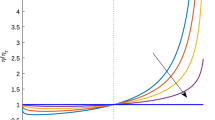Abstract
A class of integral recursion models for the growth and spread of a synchronized single-species population is studied. It is well known that if there is no overcompensation in the fecundity function, the recursion has an asymptotic spreading speed c*, and that this speed can be characterized as the speed of the slowest non-constant traveling wave solution. A class of integral recursions with overcompensation which still have asymptotic spreading speeds can be found by using the ideas introduced by Thieme (J Reine Angew Math 306:94–121, 1979) for the study of space-time integral equation models for epidemics. The present work gives a large subclass of these models with overcompensation for which the spreading speed can still be characterized as the slowest speed of a non-constant traveling wave. To illustrate our results, we numerically simulate a series of traveling waves. The simulations indicate that, depending on the properties of the fecundity function, the tails of the waves may approach the carrying capacity monotonically, may approach the carrying capacity in an oscillatory manner, or may oscillate continually about the carrying capacity, with its values bounded above and below by computable positive numbers.
Similar content being viewed by others
References
Anderson M.: Properties of some density-dependent integrodifference equation population models. Math. Biosci. 104, 135–157 (1991)
Courant R., Hilbert D.: Methods of Mathematical Physics II. Interscience, New York (1962)
Diekmann O.: Thresholds and travelling waves for the geographical spread of an infection. J. Math. Biol. 6, 109–130 (1978)
Kot M.: Discrete-time travelling waves: ecological examples. J. Math. Biol. 30, 413–436 (1992)
Thieme H.R.: Asymptotic estimates of the solutions of nonlinear integral equations and asymptotic speeds for spread of populations. J. Reine Angew. Math. 306, 94–121 (1979)
Thieme H.R.: Density-dependent regulation of spatially distributed populations and their asymptotic speed of spread. J. Math. Biol. 8, 173–187 (1979)
Thieme H.R., Zhao X.Q.: Asymptotic speeds of spread and traveling waves for integral equations and delayed reaction-diffusion models. J. Diff. Equ. 195, 430–470 (2003)
Weinberger, H.F.: Asymptotic behavior of a model in population genetics. In: Chadam, J.M. (ed.) Nonlinear Partial Differential Equations and Applications. Lecture Notes in Mathematics, vol. 648, pp. 47–96. Springer, Berlin (1978)
Weinberger H.F.: Long-time behavior of a class of biological models. SIAM J. Math. Anal. 13, 353–396 (1982)
Author information
Authors and Affiliations
Corresponding author
Additional information
B. Li’s research was partially supported by the National Science Foundation under Grant DMS-616445.
M. A. Lewis research was supported by “The Canada Research Chairs program,” and a grant from the Natural Sciences and Engineering Research Council of Canada.
Rights and permissions
About this article
Cite this article
Li, B., Lewis, M.A. & Weinberger, H.F. Existence of traveling waves for integral recursions with nonmonotone growth functions. J. Math. Biol. 58, 323–338 (2009). https://doi.org/10.1007/s00285-008-0175-1
Received:
Revised:
Published:
Issue Date:
DOI: https://doi.org/10.1007/s00285-008-0175-1




